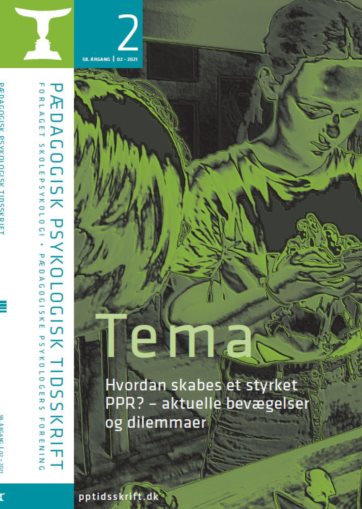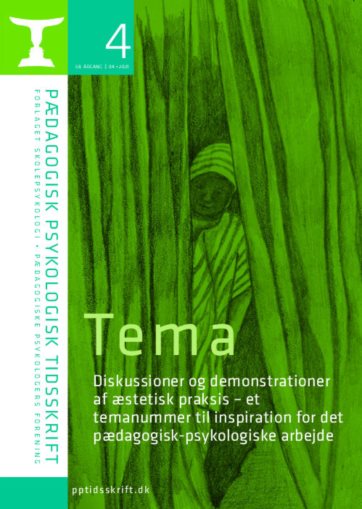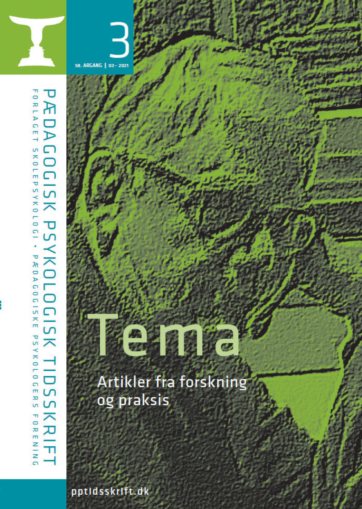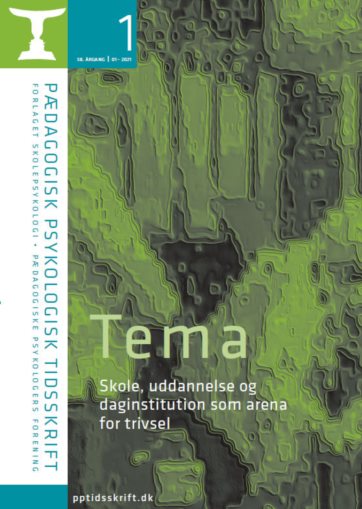Beskrivelse
Abstracts ppt 2/2021: Hvordan skabes et styrket PPR? – aktuelle bevægelser og dilemmaer
Jørn Nielsen and Søren Hertz: The tendency in the reduction and disjunction of what is to be understood as complex and interdependent
The greatest risk of modern society is the tendency in the reduction and disjunction of what is to be understood as complex and interdependent . Based on this, we rec- ommend PPR (the Danish school psychology agency) to specialise in working with complexity, which requires a new orientation and a redefinition of the agency’s po- sition in the entire field of children’s and adolescent’s lives . Based on children and adolescent’s socialisation as multiple, PPR must specialise in working with wicked problems, which requires a more independent meta-position that is separated from the traditional position as serving mainly the pedagogical environment in schools and daycare institutions . PPR must have the freedom to move around in different important arenas and contexts, deal with embedded paradoxes and design and take leadership of meta-enquiries in order to create crucial and necessary new under- standings and orientations . The focus must shift from symptoms as individual char- acteristics to symptoms as communication and special invitations to establish cir- cles of inclusion leading to thriving and development . Development, change and learning is a challenge and a gift for the child, family, school, kindergarten and pro- fessionals . This change of professional mindset and the new position will be benefi- cial for special, as well as for general areas . PPR’s specialisation in working with complexity will bring implications for organisational structures, visitation and the options for creating and collecting practice-based evidence .
Charlotte Højholt & Maja Røn Larsen: Communities and situated inequality – children’s social conditions for the influence and development of their conduct in everyday life
This article analyses inequality related to social situations and different access to social resources and conditions for children’s participation in social communities and their common conduct in everyday life across schools, institutions and families . To enable this, the article presents theoretical discussions about children’s conduct in everyday life and the social communities they arrange together . Through exam- ples of unequal social conditions for participation, it is discussed how inequality is produced through social dynamics and processes of collaboration among different parties professionals, as well as children and parents . It is shown how such processes can lead to deadlocks, resignation and categorisa- tions of individual deficits – restricting the options for action and room to manoeuv- re regarding overcoming difficulties at school.This perspective on community dynamics and unequal conditions for participati- on is related to the work of educational psychologists in school, and their possibili- ties of contributing to an expansion of the realm of understanding and developing the social conditions of participation in children’s and young people’s everyday life across different contexts.
Mats Anderberg and Torbjörn Forkby: Early and coordinated efforts to promote children’s and young people’s well-being and offer complementary support to those in difficult life situations is a highly prioritised goal of the Swedish policy and also it is also reflected in other Nordic countries
The development of early and coordinated efforts to promote children’s and young people’s well-being and offer complementary support to those in difficult life situa- tions is a highly prioritised goal of the Swedish policy and also it is also reflected in other Nordic countries . The Scottish model, Getting it right for every child (GI- FREC), has been used as an exemplary way to proceed, and several development processes have started to implement local versions inspired by the model . Reforms in the public sector have to consider the soil in which a new model is supposed to grow, and even well-thought models could experience hindrances if challenging pre-existing routines, traditions and overall practices . An example of this is the co- ordinating tool and practice associated with the GIRFEC child’s plan in relation to the coordinated individual plans (SIP) already offered to accomplish the intentions using a similar approach . The article compares these plans by reviewing previous literature about their respective implementation and function . The results indicate deviations, while the children’s plans (in Scotland) having contributed to interpro- fessional collaboration, the SIP has functioned as a device for sorting out responsi- bilities between involved authorities . Also, children’s and parents’ participation in planning seems to be greater in Scotland . The comparison points out several struc- tural obstacles needed to be considered in the further implementation of coordinat- ed children’s plans .
Anette Kureer: PPR’s role, self-understanding and relevance in the work of creating participation opportunities in schools and kindergartens for all children
This article discusses PPR’s self-understanding, raison d’être and role in the inter- disciplinary collaboration around children, children’s development and the goal of ensuring participation opportunities for all children . Over the years, it is clear that as a phenomenon, PPR is, and has been, stretched between a number of different understandings and expectations, which in many ways stand in the way of forming a common ambition about what PPR is and what PPR should be .
If PPR is to be a relevant player in relation to children’s well-being and develop- ment, we need to adjust both the understanding of the profession and the common view of what PPR’s most important role really is . PPR’s task is to be available and present to ensure timelines and an evaluative and systematic practice that involves all parties around the task . The goal must always be to provide opportunities for participation for all children in public communities before we can rightly invoke the recognition that we can actually help to make a difference – both for the adults, who face a massive task on a daily basis and for the children and young people, we are put in the world to provide opportunities to thrive, learn, develop and succeed .
Christoffer Granhøj Borring: The practice-near turn in interprofessional collaboration in school – current and historical individualisation in school psychology
In recent years, there has been a tendency to move the collaboration between school professionals and professionals at Pedagogical and Psychological Counselling (PPR) out of the meeting rooms and into the classrooms . The article discusses if this ten- dency is a new way of dealing with a historical tradition of individualising problems in school . From a historical perspective, PPR’s traditional services have focused on the individual assessment of children, and throughout history, this approach has continuously been criticised for relying on the simplistic understandings of school problems, and there has been an ongoing request for greater involvement of contex- tual aspects of difficulties at school . However, both currently and historically, it se- ems that there are different understandings of how contextual aspects are under- stood and brought into the collaboration . Descriptions of practice-near approaches often take their departure in criticisms of consultative approaches, but the article analyses how both the consultative and the practice-near turn in school psychology can be conceived as attempts to transcend historical problems in school psychology . If the practice-near approach is to avoid reproducing the historical tradition of indi- vidualising school problems, the collaboration should not only be moved closer to practice, but it must actively explore what conditions contribute to the fact that dif- ficulties in schools are still often linked to inadequacies of individuals . The article is a part of a PhD project that investigates interprofessional collaboration at school when Pedagogical and Psychological Counselling (PPR) is involved to support tea- chers and pedagogues in their work with the development of inclusive learning communities .
Thomas Szulevicz and Torill Moen: Between the individual and system – a qualitative study of the advisory role in Danish and Norwegian educational psychology service centres
Both the Danish (PPR) pedagogical-psychological counselling service and the Nor- wegian pedagogical-psychological service (PPT) have undergone significant changes over the past 20 years . Broadly speaking, the changes in both countries can be boiled down to the fact that national authorities in both countries have wanted to move PPR/PPT towards more consultative and system-oriented ways of working . Some of the processes of change have taken place as a result of changing legislation and ideological and theoretical currents that have identified the importance of pre-ventive and context-sensitive approaches and forms of intervention . At the same time, PPR and PPT employees are expected to continue to both be able to make in- dividual reports/assessments . as well as provide consultative services . In this study, we interviewed six PPR / PPT employees (three in Denmark and three in Norway) . The purpose of the article is from an ‘insider’s perspective’ 1) to illuminate how the work in PPT/PPR is experienced in a Norwegian and Danish context, and 2) to ana- lyse how our comparative empirical material can be used to nuance and perspective our understandings of the current movements in the field of educational psychologi- cal practice .
Thomas Szulevicz, Rolf Lyneborg Lund and Peter Clement Lund: Problems related to educational psychology service centres
Based on access to the Danish national corps of external examiner’s database, this paper deals with the educational psychological master thesis by analysing all sub- mitted thesis statements for Master theses in Denmark from 2014-2019 . This com- prises a sample of more than 4,000 Master thesis statements from the six Danish universities that provide psychology study programmes . Among these, approxi- mately 5% of the master theses are identified as explicitly dealing with problems related to educational psychology service centres .
Methodologically, the analysis is based on a mixed-methods design, using a) sen- timent analysis aimed at classifying and detecting trends within the identified the- sis statements and b) a qualitative and thematic analysis of the different detected trends . Results show thematic trends, theoretical and methodological preferences in edu- cational psychology master thesis projects . The article concludes by discussing how universities, students and educational psychology service centres could engage more strategically in future collaborations related to Master thesis projects .
Anne Morin: School psychological expertise in early inter-professional and cross-sectoral collaborations and interventions
Based on empirical research in early inter-professional collaborations across schools, school psychological services and psychiatry, this article will discuss oppor- tunities, dilemmas and challenges in inter-professional and cross-sectoral collabora- tion related to the school psychologist’s task management and professionalism . The article will discuss professional expertise in the work of school psychologists as part of broader challenges and changes in professional work, for example, movements from a classical expert role towards collaborative and transformative expertise, as well as challenges of a traditional mono-disciplinary practice (Engeström 2018; Ed- wards 2011; Morin 2019) . The article presents new knowledge about the changes these new border-crossing organisations entails, with a particular focus on challen- ges and opportunities in the inter-professional and cross-sectoral meetings . On this basis, questions about the meaning, challenges and potentials of these meetings are raised in relation to task solution in school psychology, but also related to the psy- chologist’s professional position in the collaboration .
Micki Sonne Kaa Sunesen: Themes of future attention in the PPPR-C (Pedagogical Psychological Resource Centre)
This article describes findings from an action research project in the Municipality of Lolland . The project was carried out from November 2020 to May 2021 . Through 13 qualitative focus group interviews and 10 pedagogical processes where The Mo- saic Approach has been used in order to give children with special needs a voice – results related to the future organisation of and way of working in the PPPR-C (Pe- dagogical Psychological Resource Centre) are shared . Results are listed as 10 speci- fic themes of future attention .



